Category — Life
Lost and found
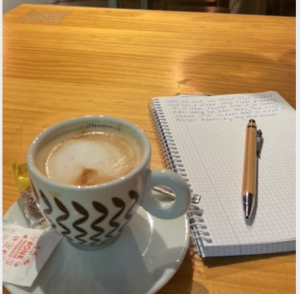
“I feel comfortable in the world in a way I have never felt before. Never in my younger life. Never in the life I just recently left to be here. I am in a foreign country, among strangers, where I know too little of the language, finding (and sometimes not finding) my way, often clueless. Yet there is this peace.”
I wrote this in a blue spiral notebook I bought on day six of the Camino in a shop in Estella that I happened upon while lost on winding streets trying to find my way to my albergue. I was lost a lot. That late afternoon, I was really lost. I happened upon the shop by pure accident and enjoyed a moment of feeling like I knew what I was doing. I needed a notebook. And I actually remembered the word for notebook in Spanish. So I asked the man behind the wooden counter for a cuaderno. I also asked him donde esta mi albergue…and he laughed and pointed across the street.
A week later I was sitting in a little café in Burgos taking a rest day and transcribing the voice memos I had made while walking. This, the one about feeling comfortable and at peace, was one of them. I listened to my own slightly breathless voice with the crunchy sounds of my footfalls in the background. And I wrote in the blue notebook.
I remember everything about this café, how I found a little corner table upstairs and had the space to myself, how I teared up when I heard Ray Charles singing “Georgia on my Mind” over the sound system, how I felt bone-tired and overflowing with energy at the same time, and oh, the creaminess of the café con leche. I had to order another. But as I transcribed, I didn’t remember what prompted me to record this note to myself. Was it a particular moment? A conversation I had with a fellow pilgrim? The mountain views that felt like home but weren’t?
It is three months to the day I wrote this in the blue cuaderno. And only now do I think I know what I meant back then:
When you leave everything behind, you encounter the essential you. Boy does that sounds cheesy. Or bumperstickery. But bear with me, friends. I mean you have the opportunity to encounter, to be, that person who is not attached to things or people, who, for the moment, has no home. You are without portfolio. No one knows your backstory. You are not who you were. You are who you are. Who you forgot you were. And truly, there is peace in that.
January 4, 2023 5 Comments
Choosing challenges
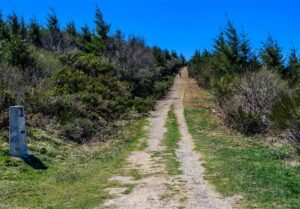
Kiki and I had decided to go for it. It was day 26 on the Camino. We would walk almost 30 kilometers from Villafranca to the tiny village of O Cebreiro, the last 12K of which would be a climb of 600 meters. That is an almost 2000 feet ascent. At the top, up at about 4500 feet, the views were supposed to be spectacular. Many pilgrims split this section in half. Not us.
Before I continue this story, you should know a few things: First, apparently when the ancient path that is the Camino Francés was created, no one had ever heard of switchbacks. When you go up, you go straight up. More harrowing, however, are the descents, especially down very narrow, rocky trails that are more like slot canyons than paths. Both would be part of that day’s hike.
The second thing you should know is that there were five kinds of rain that day: spitting rain, heavy rain, downpours, horizontal rain, and wind-gusted torrents.
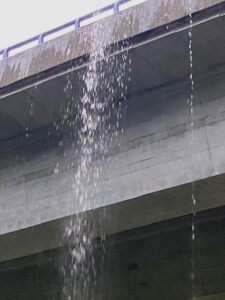
And thirdly, to put these two together, there would be five kinds of mountain ascents and descents that day: muddy with slippery leaves, muddy with rocks, muddy and rocky with cow pies, and ludicrous.
We hiked, tromped, trudged, slogged—and peregrinated (we were, after all, peregrinas) for 10 hours. Yes, 10 hours. What did we talk about? The Wife of Bath, the glories of cheap Spanish wine, how we both knew and used the word “peckish,” Joan Didion, Roz Chast, snappy comebacks we could have made to that bitch M but didn’t think of in time, lame jokes about our emergency stashes of almonds which we persisted in referring to as “nut sacks.” Also, much silence. And more than a lot of cursing.
By then Kiki and I were soul (I am so tempted to be cheesy here and write “sole” as in, you know, shoes) sisters. We had crossed paths during the first third of the journey, coming in and out of each other’s hiking lives until it was obvious to both of us that we belonged together.
Allow me to fast-forward as you do NOT want to slog along. When we finally got to the little village at the top. Kiki turned on Google maps to locate our lodging for the night. Google maps confidently informed us that the lodging did not in fact exist in this town but was, instead, located 4k away (that’s another 2.5 miles) in a town we never heard of. Various bad words were uttered. And then, on we hiked, at first hard by a busy highway, then up through a sketchy, unmarked forest path. Did I mention the rain?
We got to the aforementioned town. The colorful town map directed us to the hostel. Which was not there. Walked back to the map. Yes, on the map. No, not actually in the town. Maybe you want to know what we did then? But I do so like a cliff-hanger.
Besides, if you know my writing, you know that I employ the small story to illuminate the larger issue. Here’s the larger issue: It is about choosing challenges. How life throws shit at you, trials and tribulations, illnesses and deaths, unexpected, unwanted, unmooring. This day–the Camino itself–was about my power to choose the challenge. About the privilege of being able to choose what is hard and uncomfortable, risky, chancy. This is how you strengthen the resilience muscle before you need it. It is practice for the challenges that come unbidden.
Ultreia.
December 28, 2022 8 Comments
The coming of the light
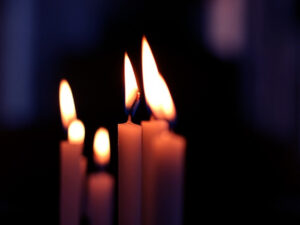
Almost every morning I walked in the dark, my head lamp illuminating the way ahead, but just barely. In Spain, even as early as late September when I started the 500-mile Camino Francés, dawn came later than I was used to. By the third week of October, as I was nearing the end, the sky didn’t lighten until close to 9 am.* And I was walking west, facing the darkest edge of the sky.
I am unaccustomed to walking without fear in the dark. What woman walks without fear in the dark? Some inky mornings I would walk for an uncomfortable distance without seeing the familiar waymarker, that bright yellow arrow announcing I was headed the right way. Some mornings, walking out of small villages into the black pre-dawn, I would see up ahead a dim light, the head lamp of a pilgrim in front of me. That sense of being alone but not alone was one of the core experiences of this journey. To be both solitary and connected, self-sufficient yet dependent. It’s hard to recapture that now, yet it was my everyday life then.
Occasionally, especially navigating through city streets I would get lost. Getting out of Burgos, I was spectacularly lost. I was without cell service, without maps, both a terrifying and a liberating experience. When I finally did come upon an embedded shell-marker in the pavement, my relief was so overpowering I believe I may have cried.
Sometimes I was so intent on looking ahead into the darkness, of navigating the uncertainty, of needing reassurance that I was on the right path, I forgot that the dawn was happening behind me. And then I turned, and there it was: a soft gray flannel rim to the sky, or lemon yellow streaks, or once the pale blue and pink of a baby’s room. And boom. If that is not a life lesson, my friends, I don’t know what the hell is.
It took some time to learn to embrace these mornings. But after a while, the pre-dawn hours were the most glorious, empowering moments of the long day.
I write about this today, Winter Solstice, the latest dawn, the longest night, reminding myself, reminding us all, about the coming of the light.
*Spain’s clocks have been set to Central European time since World War II, which means the sun rises considerably later compared to countries in its region.
December 21, 2022 No Comments
We don’t meet anyone by chance*
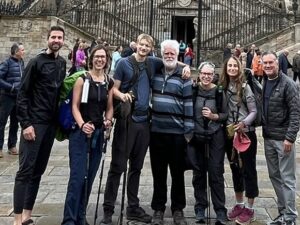
Harry. “Harry, like the Prince,” he says to me, introducing himself, “Harry, like Potter.” Harry is a 23-year-old from London, fresh out of university and an expert in everything, from literature to philosophy to finance. He lectures me on Aristotle and the existence of alternative realities, on the proper footware for the Camino. I can’t wait to lose him along the way.
Joan. She walks slowly and encourages you to walk ahead. She will catch up at the next village, she says. And she does, always. She is 79, bird-like in body with eyes that dart everywhere and take in everything. At dinner one night, a raucous pilgrim meal in an impossibly crowded room, she asks for a second bottle of wine, even though our little table hasn’t polished off the first. And she gets up and takes the bottle over to a table with four South Korean girls we all know from the trail, and she pours them each a glass. And then takes the bottle over to the next table where three guys, Italians, sit. One gets up and hugs her. Another smiles, slyly, “You want to get us drunk and take advantage of us, don’t you?” he says.
Alexander. He injured a tendon and has been sidelined for a week in a tiny village inhabited by more goats than people, an outpost with one church, one restaurant, one bar. Every day he borrows a guitar from the guy who owns the bar, sits in the sun and plays. He asks me what I’d like to hear. I tell him Dylan. He sings it in French. I think: I could stay here for a while.
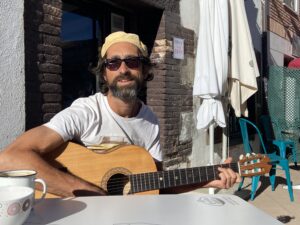
Maria, from the Netherlands, who carries her demons with her. Yevgeny, the son of Russian Jews who fled to Israel. Michael from Derry who has his first of a half-dozen beers at 10 in the morning. Emily, quiet and sweet. Jo, who never seems to have a down day. Andre, a young man in search of himself. Hans, from Norway, the big tough guy who calls his 6-year-old daughter every night.
On the Camino, enmeshed in the intimacy of that fluid community, you learn a lot about people. I don’t mean the facts of their lives, although there is that. I mean what kind of people they are: humble or vain, talkers or listeners, people who observe, who are curious and struck by wonder. Or not. People who think you are interested in seeing the x-rays of their bunion surgery that they happen to have saved on their iphone. People who tell you they went to the same middle school as Joan Didion and assume, oh-so-correctly, that this will forge a bond. People with a sense of humor, with a sense of purpose, with no sense at all.
*Avijeet Das, a poet and a writer from New Delhi, India.
December 14, 2022 4 Comments
Everything changes
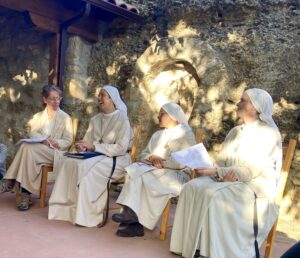
“Because I still matter,” one older woman said.
“Because I need to figure out what matters,” said a young man.
“Because I need time to think.”
“Because I think too much.”
There were maybe 30 of us pilgrims sitting on wooden chairs, crowded together in the little interior courtyard of the Iglesia de Santa Maria in Carrión. It was the late afternoon of my sixteenth day walking the Camino Francés. One of the four Augustinian nuns who would be leading us in song had asked us to say why we were on this journey.
“I need to do something to separate the life I’ve been living from the life that is now in front of me,” is what I said. “It needed to be something big.” There are so many moments on the Camino that grab hold of you, that surprise you, that sandblast you. This was one of those moments: Saying those words aloud, admitting the enormity of this transition, the blank canvas of the future. Being in the presence—and oh man, was it a presence– of these nuns, one of whom was so beatific that it was easy to imagine she had been touched by God. Even if you didn’t believe there was a God. Sitting in the fading sun with people from around the world, people you didn’t know but in that moment you knew intimately. Turning my head to see Kiki, our white hot friendship still in its early days, crying as we sang “Amazing Grace.”
And then the final song, the refrain of which went like this:
Todo cambió todo. Everything changes everything.
The song was lovely. But as I sang the words, I thought yeah, sure, I know this. Change is the only constant. The times they are a’ changin’. To exist is to change. Yep, got it.
But then I walked some more, a lot more, and a lot more after that. And I got home and slept in my own bed and made my solo dinners and stood here in front of this computer and did what I do. Then one afternoon I ventured out for coffee. Todo cambió todo.
“When you come out of the storm,
you won’t be the same person who walked in.
That’s what this storm’s all about.” ― Haruki Murakami
December 7, 2022 9 Comments
A landscape of kindness

“Choose to be kind” proclaim the wooden signs stuck in the lawns of every other front yard in my town.
I think about this a lot, about how performative “activism” (words, signs, t-shirts, bumperstickers) too often takes the place of real action, how they, in fact, excuse lack of action.
I thought about kindness a lot when I walked the Camino. Or rather, I didn’t think about it as much as I felt immersed in it, as much as I felt I was part of this landscape of kindness. One very hot afternoon, my favorite walking companion (and sister-from-another-mother) Kiki and I were trudging into yet another tiny village, Hornillos de Camino, on what was probably a 26 or 27 kilometer day. We were sweaty, dehydrated and cranky. We ventured into a mercado the size of a walk-in closet, each bought an icy-cold Kaz Lemón, and hunkered down on a log outside the store, sitting in the blazing sun. A minute later, the owner of the store appeared with an apple in each hand. “Manzanas cultivar en un huerto local,” he said, smiling and handing us the fruit. Then he insisted we move into the shade on a bench near his little store. That’s it. That’s not a lawn sign. That’s the real deal.
Another day, walking in the late morning with a soft-spoken Australian woman named Emily, we found ourselves winding down the steep cobblestone streets of a small village. I think it was Zuriain. It had been raining, misting really, and the stones were slick. We turned a corner and saw a small group gathered around a man sitting on the ground. When we got closer, we saw that his forehead was bleeding, and he had a gash across his nose. His left leg was outstretched, elevated on a pack. The ankle was wrapped. His toes were swollen and blue. He had slipped and fallen a few minutes before.
Brian, a nurse from Colorado whom I had met and walked with briefly the day before, had wrapped the ankle. Others walked with first-aid kits. He walked with a medical kit. Another pilgrim whose phone had a Spanish sim card had called an ambulance. It would take a while to get here. A third was speaking to the man’s wife in the Netherlands. Emily and I stood there for a moment. Then she walked over to his side, kneeled and took his hand. Just held his hand.
As I write this, I am reliving the moment. I am again part of this landscape of kindness: The rain starting in earnest; the small group gathered; the man, a stranger to all, in the center. And Emily, wordless, holding his hand.
Just fall into that for a moment, my friends.

November 30, 2022 4 Comments
Everything weighs something
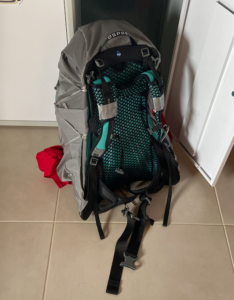
It didn’t occur to me until the fourth day of walking the Camino when my (ever-so-carefully-chosen) super-lightweight backpack with its (ever-so-carefully-chosen) super-lightweight contents started to cause a deep bone ache in my left shoulder blade. I was unpleasantly—painfully—surprised. I had spent a lot of time thinking about and researching what to take on this 500-mile journey. I paid strict attention to grams and ounces, choosing a rain jacket I didn’t really like that much over one I did because it weighed two ounces less. I bought an ultra-light sleeping bag that closed with little plastic snaps rather than a weighty (as in 3.5 oz.) zipper.
I was relentless, obsessive. I parceled out three band-aids for my first aid kit instead of including a small box. I cut my toothbrush in half. Oh yes I did. Every individual item I chose to put in that backpack–everything I firmly believed (or was told on countless helpful websites) I would need for the journey—I chose by weight.
But…everything weights something. And all those somethings add up. All those somethings, together, were a big something. This came as an ah-ha moment four days in. It doesn’t sound like much of a revelation. But it felt like one to me as I wrapped the shoulder strap of my backpack in the moleskin I was carrying to treat the blisters I never got.
One of the things about walking every day for fifteen, eighteen, occasionally twenty miles—and then getting up and doing it again, and again, for 36 days—is that the monotony of the physical act frees you to think big thoughts. (Or sometimes no thoughts at all. )
And so, when “everything weighs something” popped into my head, I began to think big thoughts, like: Okay, this is not just about the damned backpack. It is about life. About the weight we carry. All those little somethings.
Sure, we are aware of the burden when something big happens: disease, death, divorce. That is heavy luggage. But we are often unaware of the collective weight of the many little things. That thing we should have said but didn’t. That thing we said but shouldn’t have. That misunderstanding that was never cleared up. That time someone disappointed us. That time we disappointed someone. That time we needed a little help and didn’t get it. That time we needed a little help and didn’t ask for it. That look. Oh, that look. The little slings and arrows. We stuff them away.
But they add up. And then, one day, we feel the weight.
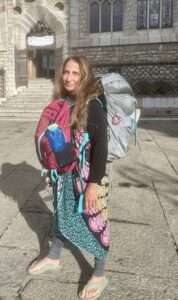
November 23, 2022 6 Comments
The Way
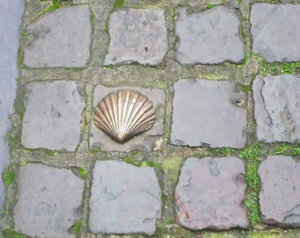
In two days I will begin making my way on The Way. That’s the Way of St. James, a network of 1000-year-old Christian Pilgrimage routes that starts at the foothills of the Pyrenees in St. Jean Pied-de-Port and ends at the Cathedral of Santiago de Compostela, where the remains of St. James are enshrined. Probably not his skull bones. (He was beheaded in Jerusalem by King Herod in 44AD.)
The hiking/ walking route meanders through high mountains and deep valleys, undulating plains, vast olive groves, the Basque country, the vineyards of Rioja, the Meseta flatlands, the green rolling hills of Galacia. Small villages dot the landscape. Very occasionally there is a town of some size, notably Pamplona (of Hemingway and bull-running fame). If this sounds like I know what I’m talking about, I don’t. I am parroting brochure language. But soon I will know. For the next 30-40 days I will live this, hiking through it, seeing what I have never seen before, meeting fellow travelers, eating communal meals (and tapas at every opportunity), sleeping in rooms with bunk beds next to snoring, farting strangers. And get up the next morning and do it again.
When I have told friends that I would be doing this, I encountered two reactions. The first “oh this is on my bucket list!” I don’t have a bucket list. I don’t like the whole notion of a bucket list. But if I did have a bucket list, the Camino would not have been on it. I knew zero about the Camino—I mean I didn’t know of its existence—until I crossed paths two years ago with the documentarian Lydia Smith, director of “Walking the Camino.” It’s a beautiful film. I watched it (as you should too) and didn’t think about the Camino again until after Tom died. Then it occurred to me that this journey was just the kind of deep, immersive, solitary adventure I needed and wanted. Also, Tom never ever in a godzillion years would have wanted to do this. So I would not have to bear any “I wish he were here to share this” thoughts.
The second reaction when I told friends I was going off on this adventure was: “You’re going to write about this, right?” Well, that is what I do. So yes, I am. But in what way, in what form, I do not know. I will find my Way.
September 21, 2022 7 Comments
Resilience
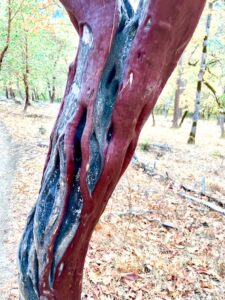
You trip over a fallen log and gash open your leg on a spiky branch. And by “you” I mean me. And the wound is cleaned and stitched, and you heal. You’ll have a scar but big deal. The body is resilient. The body knows what to do. Would you have healed faster when you were younger? Yes. It is true. The older we are, the slower we heal. Physically.
Or you go for a long run or a hard hike. And by “you” I mean me. And maybe the next morning you feel it. So you’ll be a little sore. Big deal. The body is resilient. The body knows what to do. Would you have recovered faster when you were younger. Yes, it is true. The older we are, the longer it takes to bounce back.
But there is a kind of recovery that grows stronger with age, and it is more important than physical mending. It is emotional resilience. It is the ability to cope with and respond to setbacks and challenges, to unwelcome changes, to losses. To, you know, Life with a capital L.
When I was thirteen, Myles Cooley, my first boyfriend, my first love, the first boy I kissed, dumped me. I was devastated in a way I still remember. My heart ached. I cried. Every song on the radio was about love. So I cried some more. At that age, I had zero tools in my emotional resilience toolbox. I thought about him for years, yes years, afterward. I did not give my heart away (as a teen girl would put it) until I met my college boyfriend five years later.
But time and circumstance are good teachers. You learn. And by “you” I mean me. You develop problem-solving skills. You acquire coping strategies. You learn how to manage your emotions. You nurture what psychologists call an internal locus of control, that powerful belief that your actions can affect the outcome of events. This imbues you with a sense of confidence and control. You learn that you are a survivor.
You didn’t know any of this when you were thirteen.
Now you do.
And, although there is toughness that comes from this learning, there is also buoyancy.
Photo (mine): Madrone bark, Lithia park, Ashland
September 14, 2022 1 Comment
Bitter/ Sweet
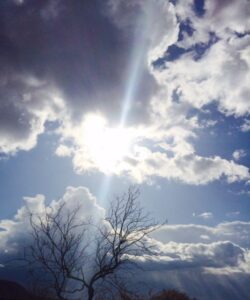
Slathering moisturizer on my face this morning, I was struck by the irony of it. Throughout my adolescence and teens and into my twenties, I labored day and night to remove moisture (as in: oil) from this face. I stared in the mirror, angsted over every pore, panicked over break-outs, scoured the pages of Seventeen magazine for the best creams and cover-ups that promised to dry out my skin. And now it’s all about putting that oil back in.
The yin and yang of it. And how life—not just skin– is all about that.
You are a fifteen-year-old know-it-all (speaking for myself) who learns, over time, how very little she knows.
You are drawn to drama. Then you understand the power and poignance of understatement.
You think you are the only one to whom this (fill in the blank for “this”) has ever happened. And then you find you are part of a silent sisterhood.
You think it’s always going to be this way. And then it isn’t.
You spend years, decades, working your way into the “comfort zone” and then realize that the dis-comfort zone is where real growth happens.
You can’t wait to get away. And then you can’t wait to come home.
You acquire and collect and save and store. And then all you want to do is give away and declutter.
You think joy and sorrow are opposites. Then you read Joseph Campbell’s entreaty to “participate joyfully in the sorrows of the world.” And, boom.
You learn to love and then you learn to let go.
You think loss is the end. You come to realize it is the beginning.
Recommended reading: Bitter-sweet: How Sorrow and Longing Make Us Whole.
June 22, 2022 3 Comments





